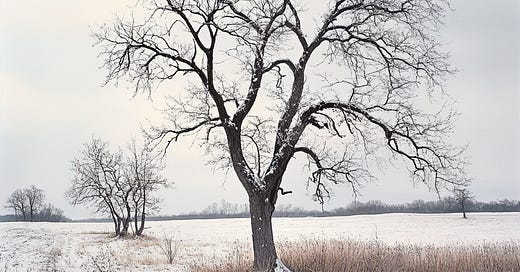A Surprising Inauguration Day Emotion
Not anger, not anxiety, but something more intimate and more generative.
I’ve had an unexpected feeling as Trump’s inauguration nears: sadness.
Like many of you, I think, I’ve been experiencing a roller coaster of emotions over the last few months when it comes to politics: disgust, anxiety, fear, rage, and resignation are the ones that come to mind. These haven’t been my predominant feelings overall, because, oddly enough, the last two months have been really good for me personally: my work in the psychedelics field is exciting and inspiring (and time-consuming), and things are good in my personal and family lives as well. On balance, I’m quite fortunate and quite well. It’s a bizarre contrast.
Even when it comes to politics, not all of my emotions are ‘negative’ ones. I’ve come to a place of relative peace when it comes to the election results; I’ve written about that here and here, and still pretty much believe what I wrote two months ago. We are, at this time, swept up in large, global currents that have affected every nation on Earth. Like it or not (and I do not), Donald Trump is a world-historical figure. It’s not about what the Democrats could have done better.
Still, when seemingly out of nowhere, I experienced a new political emotion today, I admit it was a bit of a surprise. Apparently there are still new things to feel after all. And here it is: a kind of wistful, long-view sadness about what is about to unfold. Not grief exactly, and not despair or depression. Just sadness.
This emotion is a friend of mine. It’s the sort of sadness that arises every day as part of a mindful life; it feels authentic and truthful and real, not debilitating like depression and not tied to a story about the future like despair. I wrote a book about this kind of sadness entitled The Gate of Tears: Sadness and the Spiritual Path. And for almost twenty five years now, I’ve meditated with it, prayed with it, accepted and not accepted it; we have a good, long-term relationship. I think’s a generative emotion — it’s inspired many of my favorite works of art, music, and film. And settling into it can be, for me at least, a gateway to a profound and sweet equanimity. The release that comes from just letting it be is among the most easeful of “it is what it is” experiences.
In the political realm, though, sadness can be a little subtle. Other emotions, like anger, are a lot louder. And there’s a myth that being in touch with sadness takes energy away from the work we need to be doing. (In fact, I find it takes more energy to constantly tread emotional water in order to avoid feeling it.) But it’s often in there. And it, too, is generative.
In feeling sadness for what my country has become, I can feel connected to what I love about it. America is such a flawed experiment, such a powerful juxtaposition of success and failure. This county pioneered the most robust form of democracy in history. It boldly protected freedom of speech and religion. It has nourished technological innovation, scientific breakthroughs, Broadway, Hollywood, the ‘American songbook,’ rock & roll, jazz, and so much more.
And yet, we collectively have never been willing to face our greatest sins: the genocide of indigenous peoples and the enslavement of millions of people of African descent. (I looked it up just now: in 1860, there were 4 million slaves in the South, equal to nearly 90% of the African American population.) To even speak of these things today is to risk being labeled “woke,” as if facing the truth of history is equivalent to the most misguided or overzealous fulmination. As if the truth itself is to be shunned.
But the truth is what it is, and is as present today as two hundred years ago. As America prepares to deport hundreds of thousands of migrants (including, if the Supreme Court doesn’t stop it, citizens lawfully born here to undocumented parents) we can see the insecurity of white Americans, their inability to surrender their position of dominance, their panic at a multicultural America. As MAGA’s Christian Nationalist wing takes over education and health policy, we can see its desperate attempt to cling to its position of dominance, forcing Americans to conform our lives to their repressive ideal.
This is a profound shortcoming in American civic conscience. Around a quarter of the country just cannot accept that America might not remain a predominantly white, Christian, straight-male-led society, and would rather institute a kind of nationalist authoritarianism than accommodate themselves to a changed reality. We could have been a better country, I think. It’s sad to consider what we might have been, instead of what we have always been.
I’m also sad because a second quarter of the country didn’t know or didn’t care enough about any of that stuff and voted on deeply misguided beliefs about the economy. As I’ve written, I am deeply sympathetic with the spiritual and material impoverishment of working people in this country. Despite recent progress, their sense of economic dread is justified.
Keep reading with a 7-day free trial
Subscribe to Both/And with Jay Michaelson to keep reading this post and get 7 days of free access to the full post archives.





